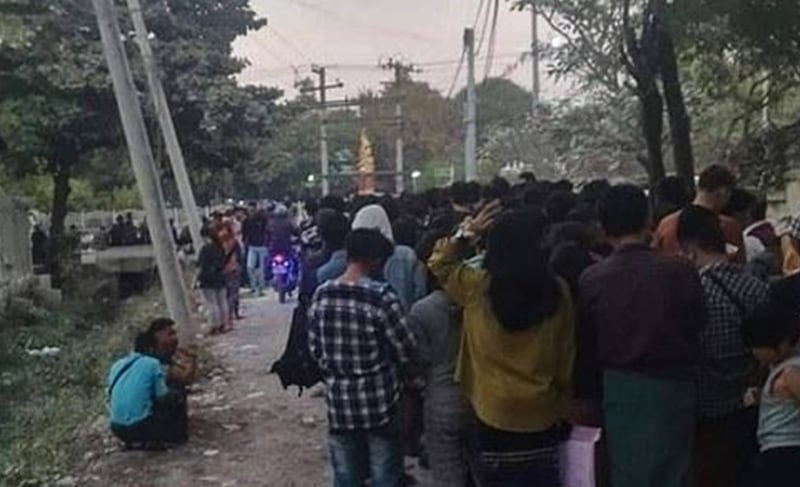Two women who were caught in a crowded pre-dawn queue at a government passports office in Mandalay died of suffocation as several thousand people who hope to leave the country in the coming weeks crammed together inside a fenced-in area.
The deaths illustrate the anxiety widely felt ahead of the military junta’s upcoming enforcement of a mandatory conscription law.
The two women – Khin Myo Aye, 52, and Khaing Wai, 39 – died at about 2 a.m. on Tuesday as people jostled for position outside of a passports issuing office in Mandalay’s Aung Myay Thar Zan township, rescue workers told Radio Free Asia.
A third person, Htay Htay Win, 53, was being treated for a leg injury at Mandalay Public Hospital.
“The place was so busy,” an official from social relief and rescue group Nandaw Shae told RFA. “There must have been thousands of people there at around half past two in the morning.”
Earlier this month, junta leader Senior Gen. Min Aung Hlaing announced that a military service law, enacted in 2010 by a previous military regime, would go into effect in the next few weeks.
About 5,000 people a month will be enrolled into the military to perform national defense duties, according to a junta spokesman.
Min Aung Hlaing’s announcement came as anti-junta forces and ethnic armies have scored significant victories against the military in Myanmar’s civil war, which escalated in October 2023 when the rebel groups joined together and launched new offensives, overrunning dozens of military camps and causings hundreds of soldiers to surrender.
Those unwilling to join the junta’s military have responded by looking for ways to leave the country – or by traveling to areas of Myanmar where the junta has lost control.

Visa applicants lined up outside the Thai embassy in Yangon last week, and hundreds of people were recently detained by suspicious junta authorities after their flights arrived in Rakhine state from Yangon.
“Some young people don’t dare to leave their house anymore,” a Mandalay resident told RFA, referring to fears they could be detained in public and immediately enrolled in the military. “They’re even afraid of crossing roads.”
Thousands line up at midnight
In Yangon, it’s possible to register online to receive a passport. In other states and regions, people must go to an issuing office in person.
The passport office in Mandalay opens at 8 a.m., but only 200 people can receive a passport each day. Thousands of people have been arriving at around midnight each night to line up near a barbed wire fenced area, the rescue group official said.
RFA’s attempts to reach Minister of Economy Thein Htay, who is authorized to speak for Mandalay’s passport issuing office and is the junta’s regional spokesman, were unsuccessful.
RFA also contacted Win Zaw Aung, permanent secretary of the Ministry of Immigration and Population in Mandalay, but he didn’t return a brief, initial call.
Junta spokesman Major Gen. Zaw Min Tun said last week that the first call-up for military service will take place at the end of April. The junta is aiming to bring in 50,000 recruits over the next year, he said.
On Tuesday, he said that women won’t face conscription anytime soon.
“Women will not be recruited immediately for military services despite eligibility under the People’s Military Services Law at the moment,” he was quoted as saying by junta-affiliated media.
The law states that every citizen must serve in the military, including all men aged 18 to 35 and women who are between 18 to 27 years of age. Under Min Aung Hlaing’s directive, those who refuse to serve for two years could face up to five years in prison.
The shadow National Unity Government has urged people to defy the conscription law.
Translated by Kalyar Lwin and Aung Naing. Edited by Matt Reed and Malcolm Foster.
